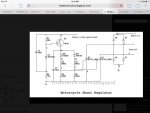Vic.S
Rear Admiral
- Joined
- May 4, 2004
- Messages
- 4,701
Just a couple of points
The resistance tests on the stator wont detect shorted turns.
There may be some testing you can do described in the "Troubleshooting Guide" on the CDI Electronics website.
If the battery is in a lowish state of charge it'll take a while to get the volts up , even at WOT
Its worth charging the battery fully off the boat with a decent charger. Charge it until it still reads 12?7 ish volts 12 hours after coming off charge.
The resistance tests on the stator wont detect shorted turns.
There may be some testing you can do described in the "Troubleshooting Guide" on the CDI Electronics website.
If the battery is in a lowish state of charge it'll take a while to get the volts up , even at WOT
Its worth charging the battery fully off the boat with a decent charger. Charge it until it still reads 12?7 ish volts 12 hours after coming off charge.





















